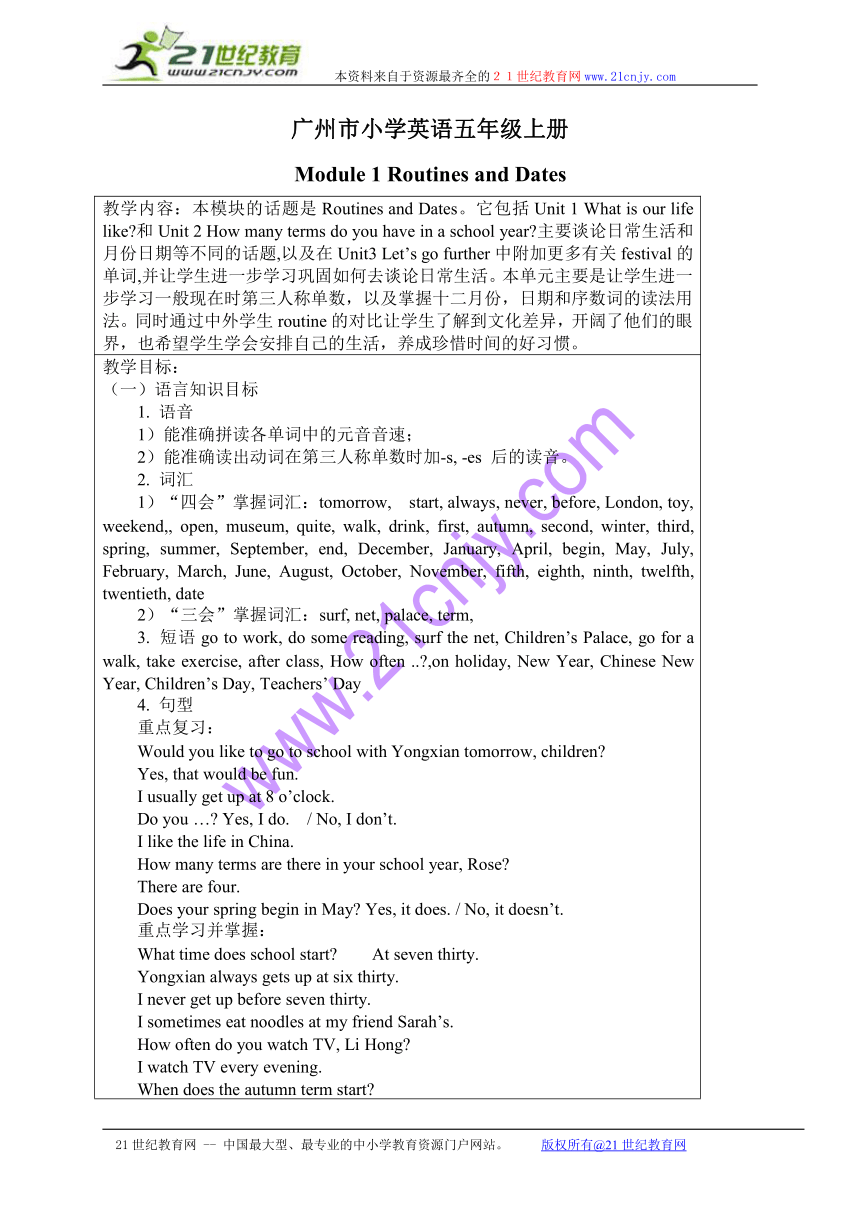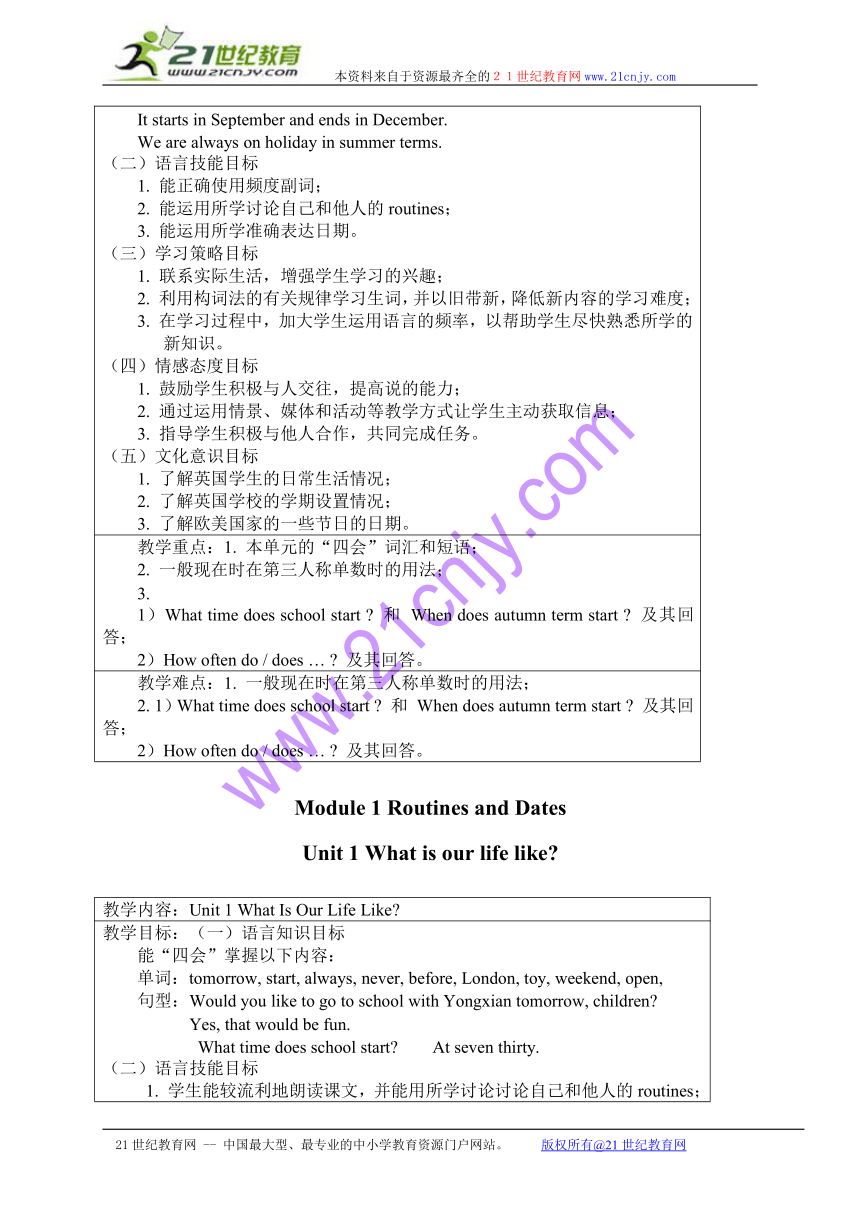五年级英语上册教案 module 1 unit 1(广州版)
文档属性
| 名称 | 五年级英语上册教案 module 1 unit 1(广州版) |

|
|
| 格式 | rar | ||
| 文件大小 | 18.0KB | ||
| 资源类型 | 教案 | ||
| 版本资源 | 其它版本 | ||
| 科目 | 英语 | ||
| 更新时间 | 2009-11-06 00:00:00 | ||
图片预览


文档简介
本资料来自于资源最齐全的21世纪教育网www.21cnjy.com
广州市小学英语五年级上册
Module 1 Routines and Dates
教学内容:本模块的话题是Routines and Dates。它包括Unit 1 What is our life like 和Unit 2 How many terms do you have in a school year 主要谈论日常生活和月份日期等不同的话题,以及在Unit3 Let’s go further中附加更多有关festival的单词,并让学生进一步学习巩固如何去谈论日常生活。本单元主要是让学生进一步学习一般现在时第三人称单数,以及掌握十二月份,日期和序数词的读法用法。同时通过中外学生routine的对比让学生了解到文化差异,开阔了他们的眼界,也希望学生学会安排自己的生活,养成珍惜时间的好习惯。
教学目标:(一)语言知识目标1. 语音1)能准确拼读各单词中的元音音速;2)能准确读出动词在第三人称单数时加-s, -es 后的读音。2. 词汇1)“四会”掌握词汇:tomorrow, start, always, never, before, London, toy, weekend,, open, museum, quite, walk, drink, first, autumn, second, winter, third, spring, summer, September, end, December, January, April, begin, May, July, February, March, June, August, October, November, fifth, eighth, ninth, twelfth, twentieth, date2)“三会”掌握词汇:surf, net, palace, term, 3. 短语go to work, do some reading, surf the net, Children’s Palace, go for a walk, take exercise, after class, How often .. ,on holiday, New Year, Chinese New Year, Children’s Day, Teachers’ Day4. 句型重点复习:Would you like to go to school with Yongxian tomorrow, children Yes, that would be fun.I usually get up at 8 o’clock.Do you … Yes, I do. / No, I don’t.I like the life in China.How many terms are there in your school year, Rose There are four.Does your spring begin in May Yes, it does. / No, it doesn’t.重点学习并掌握:What time does school start At seven thirty.Yongxian always gets up at six thirty.I never get up before seven thirty.I sometimes eat noodles at my friend Sarah’s.How often do you watch TV, Li Hong I watch TV every evening.When does the autumn term start It starts in September and ends in December.We are always on holiday in summer terms.(二)语言技能目标1. 能正确使用频度副词;2. 能运用所学讨论自己和他人的routines;3. 能运用所学准确表达日期。(三)学习策略目标1. 联系实际生活,增强学生学习的兴趣;2. 利用构词法的有关规律学习生词,并以旧带新,降低新内容的学习难度;3. 在学习过程中,加大学生运用语言的频率,以帮助学生尽快熟悉所学的新知识。(四)情感态度目标 1. 鼓励学生积极与人交往,提高说的能力;2. 通过运用情景、媒体和活动等教学方式让学生主动获取信息;3. 指导学生积极与他人合作,共同完成任务。(五)文化意识目标1. 了解英国学生的日常生活情况;2. 了解英国学校的学期设置情况;3. 了解欧美国家的一些节日的日期。
教学重点:1. 本单元的“四会”词汇和短语;2. 一般现在时在第三人称单数时的用法;3. 1)What time does school start 和 When does autumn term start 及其回答;2)How often do / does … 及其回答。
教学难点:1. 一般现在时在第三人称单数时的用法;2. 1)What time does school start 和 When does autumn term start 及其回答;2)How often do / does … 及其回答。
Module 1 Routines and Dates
Unit 1 What is our life like
教学内容:Unit 1 What Is Our Life Like
教学目标:(一)语言知识目标能“四会”掌握以下内容:单词:tomorrow, start, always, never, before, London, toy, weekend, open, 句型:Would you like to go to school with Yongxian tomorrow, children Yes, that would be fun. What time does school start At seven thirty.(二)语言技能目标 1. 学生能较流利地朗读课文,并能用所学讨论讨论自己和他人的routines; 2. 通过课文的学习,学会与人交往。(三)学习策略目标 1. 教学通过以旧带新,降低学习新内容的难度; 2. 联系生活实际,提高学生的学习兴趣。(四)情感态度目标 鼓励学生积极与人交往,提高说的能力。(五)文化意识目标 了解英国学生的日常生活情况。
教学重难点:1. 本课的“四会”词汇和短语;2. 一般现在时在第三人称单数时的用法;3. What time does school start 及其回答。
教学准备:电脑,金太阳,自备课件
教学过程:
阶段内容 师生活动 设计意图 课后反思
(一)课前热身、引入新内容 Free talk.T: How are you, children How many days are there in a week What day is today What day is tomorrow T: What time do you usually get up Would you like to go to school with Yongxian tomorrow T: What time does our school start, Yongxian What time does lunch start 板书学习tomorrow 进行对话替换练习,并引入新课
(二)呈现与操练 (课件展示Tom 和 Rose以及有关他们routines的相关图片,进行介绍。)T: This is Tom and Rose. They’re from London. Tom never gets up before seven thirty. … Rose usually gets up at 8 o’clock. … Game:分小组运用频度副词造句,看哪组造的句子最多。P1: My mum often goes home at 5.00. P2: My dad never goes home before 5. 3. 在教师帮助下,学生描述Tom 和 Rose的routines。 4. 分布呈现课文 1)先看下列问题,再观看课件到 “ I never get up before seven thirty.”,并回答问题;What time does Rose get up What time does Yongxian get up What time does Tom get up 2)继续观看课件到 “ My mum always makes noodles!”,并回答下了问题; How often does Rose eat noodles How often does Yongxian eat noodles How often does Tom eat noodles 3)带着下列问题看课件到课文结束。What time do Rose and Tom go shopping What time do Yongxian and his mother go shopping What time does Rose go to bed What time does Yongxian go to bed 5. 全班跟课件朗读课文一次。 学习频度副词及其他新单词,同时复习动词第三人称单数时的用法(此处引入How often… 句型,为第二课时铺垫)
(三)巩固操练 1. 根据提示,复述课文大意。Yongxian’s school _______ at seven thirty. So Yongxian ______ gets up at six thirty. Rose usually ____ up at 8 o’clock. And Tom _____ gets up _____ seven thirty. Yongxian’s mum _______ makes noodles at home. Rose _______ _____ noodles at her friend Sarah’s. Tom’s mum never ______ noodles. Tom and Rose ____ go shopping at the ________ . In China, the shops are still _____ in the evening. So Yongxian and his parents ______ go shopping after dinner.Tom and Rose _____ go to bed at about eight thirty. But Yongxian ____ go to bed before nine thirty. 2. 各小组分角色朗读课文,熟练的小组在准备好后进行课文表演。
(四)归纳总结 引导学生小结:Would you like to go to school with Yongxian tomorrow, children Yes, that would be fun.What time does school start 有关频度副词的句子
(五)发展 调查访谈自己的一个好友或同学,填写表格并汇报,表格如下: Name: Questions: What time do you … 频度动作neversometimesoftenusuallyalwaysget up at______ at_______ at______ at_______at_______go to school at______ at_______ at______ at_______at_______watch TV at______ at_______ at______ at_______at_______go home at______ at_______ at______ at_______at_______go to bed at______ at_______ at______ at_______at_______或者就只是访谈其他同学,并把别人的routines和自己的比较。
(六)作业 1. 听录音,熟读课文,记忆新单词; 2. 预习Work with language & Fun with Language; 3. 写写自己的或别人的routine ( 选做)。
板书设计:
21世纪教育网 -- 中国最大型、最专业的中小学教育资源门户网站。 版权所有@21世纪教育网
广州市小学英语五年级上册
Module 1 Routines and Dates
教学内容:本模块的话题是Routines and Dates。它包括Unit 1 What is our life like 和Unit 2 How many terms do you have in a school year 主要谈论日常生活和月份日期等不同的话题,以及在Unit3 Let’s go further中附加更多有关festival的单词,并让学生进一步学习巩固如何去谈论日常生活。本单元主要是让学生进一步学习一般现在时第三人称单数,以及掌握十二月份,日期和序数词的读法用法。同时通过中外学生routine的对比让学生了解到文化差异,开阔了他们的眼界,也希望学生学会安排自己的生活,养成珍惜时间的好习惯。
教学目标:(一)语言知识目标1. 语音1)能准确拼读各单词中的元音音速;2)能准确读出动词在第三人称单数时加-s, -es 后的读音。2. 词汇1)“四会”掌握词汇:tomorrow, start, always, never, before, London, toy, weekend,, open, museum, quite, walk, drink, first, autumn, second, winter, third, spring, summer, September, end, December, January, April, begin, May, July, February, March, June, August, October, November, fifth, eighth, ninth, twelfth, twentieth, date2)“三会”掌握词汇:surf, net, palace, term, 3. 短语go to work, do some reading, surf the net, Children’s Palace, go for a walk, take exercise, after class, How often .. ,on holiday, New Year, Chinese New Year, Children’s Day, Teachers’ Day4. 句型重点复习:Would you like to go to school with Yongxian tomorrow, children Yes, that would be fun.I usually get up at 8 o’clock.Do you … Yes, I do. / No, I don’t.I like the life in China.How many terms are there in your school year, Rose There are four.Does your spring begin in May Yes, it does. / No, it doesn’t.重点学习并掌握:What time does school start At seven thirty.Yongxian always gets up at six thirty.I never get up before seven thirty.I sometimes eat noodles at my friend Sarah’s.How often do you watch TV, Li Hong I watch TV every evening.When does the autumn term start It starts in September and ends in December.We are always on holiday in summer terms.(二)语言技能目标1. 能正确使用频度副词;2. 能运用所学讨论自己和他人的routines;3. 能运用所学准确表达日期。(三)学习策略目标1. 联系实际生活,增强学生学习的兴趣;2. 利用构词法的有关规律学习生词,并以旧带新,降低新内容的学习难度;3. 在学习过程中,加大学生运用语言的频率,以帮助学生尽快熟悉所学的新知识。(四)情感态度目标 1. 鼓励学生积极与人交往,提高说的能力;2. 通过运用情景、媒体和活动等教学方式让学生主动获取信息;3. 指导学生积极与他人合作,共同完成任务。(五)文化意识目标1. 了解英国学生的日常生活情况;2. 了解英国学校的学期设置情况;3. 了解欧美国家的一些节日的日期。
教学重点:1. 本单元的“四会”词汇和短语;2. 一般现在时在第三人称单数时的用法;3. 1)What time does school start 和 When does autumn term start 及其回答;2)How often do / does … 及其回答。
教学难点:1. 一般现在时在第三人称单数时的用法;2. 1)What time does school start 和 When does autumn term start 及其回答;2)How often do / does … 及其回答。
Module 1 Routines and Dates
Unit 1 What is our life like
教学内容:Unit 1 What Is Our Life Like
教学目标:(一)语言知识目标能“四会”掌握以下内容:单词:tomorrow, start, always, never, before, London, toy, weekend, open, 句型:Would you like to go to school with Yongxian tomorrow, children Yes, that would be fun. What time does school start At seven thirty.(二)语言技能目标 1. 学生能较流利地朗读课文,并能用所学讨论讨论自己和他人的routines; 2. 通过课文的学习,学会与人交往。(三)学习策略目标 1. 教学通过以旧带新,降低学习新内容的难度; 2. 联系生活实际,提高学生的学习兴趣。(四)情感态度目标 鼓励学生积极与人交往,提高说的能力。(五)文化意识目标 了解英国学生的日常生活情况。
教学重难点:1. 本课的“四会”词汇和短语;2. 一般现在时在第三人称单数时的用法;3. What time does school start 及其回答。
教学准备:电脑,金太阳,自备课件
教学过程:
阶段内容 师生活动 设计意图 课后反思
(一)课前热身、引入新内容 Free talk.T: How are you, children How many days are there in a week What day is today What day is tomorrow T: What time do you usually get up Would you like to go to school with Yongxian tomorrow T: What time does our school start, Yongxian What time does lunch start 板书学习tomorrow 进行对话替换练习,并引入新课
(二)呈现与操练 (课件展示Tom 和 Rose以及有关他们routines的相关图片,进行介绍。)T: This is Tom and Rose. They’re from London. Tom never gets up before seven thirty. … Rose usually gets up at 8 o’clock. … Game:分小组运用频度副词造句,看哪组造的句子最多。P1: My mum often goes home at 5.00. P2: My dad never goes home before 5. 3. 在教师帮助下,学生描述Tom 和 Rose的routines。 4. 分布呈现课文 1)先看下列问题,再观看课件到 “ I never get up before seven thirty.”,并回答问题;What time does Rose get up What time does Yongxian get up What time does Tom get up 2)继续观看课件到 “ My mum always makes noodles!”,并回答下了问题; How often does Rose eat noodles How often does Yongxian eat noodles How often does Tom eat noodles 3)带着下列问题看课件到课文结束。What time do Rose and Tom go shopping What time do Yongxian and his mother go shopping What time does Rose go to bed What time does Yongxian go to bed 5. 全班跟课件朗读课文一次。 学习频度副词及其他新单词,同时复习动词第三人称单数时的用法(此处引入How often… 句型,为第二课时铺垫)
(三)巩固操练 1. 根据提示,复述课文大意。Yongxian’s school _______ at seven thirty. So Yongxian ______ gets up at six thirty. Rose usually ____ up at 8 o’clock. And Tom _____ gets up _____ seven thirty. Yongxian’s mum _______ makes noodles at home. Rose _______ _____ noodles at her friend Sarah’s. Tom’s mum never ______ noodles. Tom and Rose ____ go shopping at the ________ . In China, the shops are still _____ in the evening. So Yongxian and his parents ______ go shopping after dinner.Tom and Rose _____ go to bed at about eight thirty. But Yongxian ____ go to bed before nine thirty. 2. 各小组分角色朗读课文,熟练的小组在准备好后进行课文表演。
(四)归纳总结 引导学生小结:Would you like to go to school with Yongxian tomorrow, children Yes, that would be fun.What time does school start 有关频度副词的句子
(五)发展 调查访谈自己的一个好友或同学,填写表格并汇报,表格如下: Name: Questions: What time do you … 频度动作neversometimesoftenusuallyalwaysget up at______ at_______ at______ at_______at_______go to school at______ at_______ at______ at_______at_______watch TV at______ at_______ at______ at_______at_______go home at______ at_______ at______ at_______at_______go to bed at______ at_______ at______ at_______at_______或者就只是访谈其他同学,并把别人的routines和自己的比较。
(六)作业 1. 听录音,熟读课文,记忆新单词; 2. 预习Work with language & Fun with Language; 3. 写写自己的或别人的routine ( 选做)。
板书设计:
21世纪教育网 -- 中国最大型、最专业的中小学教育资源门户网站。 版权所有@21世纪教育网
同课章节目录
